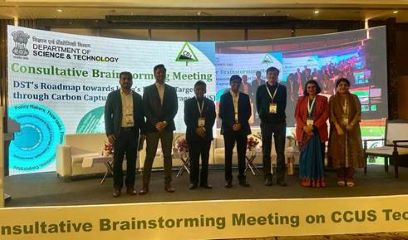Investment and funding are needed for cost effective tech deployment at scale

Experts from research and academia highlighted the need for investment both from the government and industry in Carbon Capture, Utilisation and Storage (CCUS) and the importance of leading experts in the field to work collaboratively towards India’s net zero targets through CCUS.
“Investment and funding are needed for cost effective tech deployment at scale and all leading experts in the country should come together to work towards it,” DST Secretary Prof. Abay Karandikar said at the Consultative Brainstorming Session on DST’s Roadmap towards India’s net zero targets through CCUS.
He pointed out that the status of the technology needs to be mapped and it can form the base for developing a robust R&D ecosystem where collaborative efforts can lead to translation. “There can be joint funding from industry for commercialising some technologies. A concrete action plan should include creating and funding focused incubation programmes,” Prof Karandikar added at the brainstorming session organised by the Department of Science and Technology (DST).
He stressed that DST would work towards formulation of a programme that would create an impact at the National level within the next couple of years.
The meeting focused on the opportunities and challenges related to CCUS, with an emphasis on the role of government in accelerating the development and deployment of CCUS technologies.
Senior Advisor DST and Secretary SERB, Dr Akhilesh Gupta highlighted the importance of CCUS in the scenario where the IPCC reports in the last few years have shown that global temperatures have risen by an average of around 1.2 degrees above pre-industrial levels and the catastrophe that stares at us as this is projected to rise by around 0.2 degrees per decade.
“We need several well documented pilots, detailed study of their viability, significant funding to focus on potential winners in the field to develop technologies that can actually work when deployed. Global collaborative technology development can go a long way towards success,” said Professor Rangan Banerjee, Director IIT Delhi.
Dr Anita Gupta, Head C3E Division of DST briefed about the CCUS activities of DST.
The brainstorming had active participation by senior CCUS Experts from research and academia and from difficult to decarbonise sectors such as thermal, Oil, Steel and Cement like NTPC, BHEL, ONGC, Reliance, Tata Steel, Aditya Birla Cement, UltraTech etc.
Keeping the National and International Net Zero priorities in perspective, the Department of Science and Technology (DST) has been committed towards building a robust ecosystem for CCUS. It has been consistently contributing towards the development of the CCUS value chain and roadmap for potential RD&D directions for national capacity building and multilateral/bilateral linkages.
The Consultative Brainstorming Meeting was organized with experts/representatives from relevant Industries, PSUs, Research groups, Academia, Government, and policymakers with the aim of further strengthening the CCUS value chain along its TRL trajectory and for ensuring the crucial last mile connectivity of Technology towards real field and market.
It helped boost the dialogue between relevant industry, academia, research groups, and policymakers and highlight national CCUS efforts, assess national status, and explore potential public private partnership areas.
Subscribe to our newsletter & stay updated.